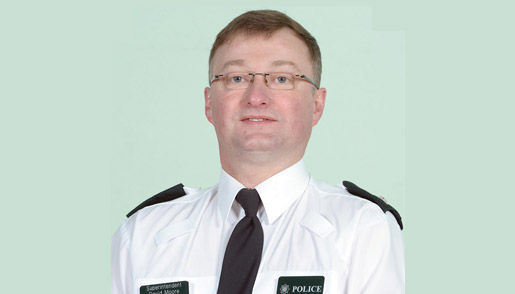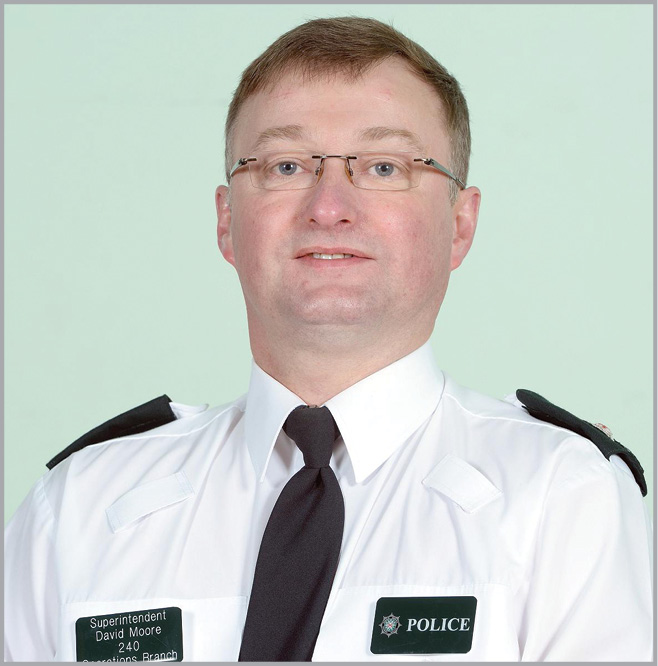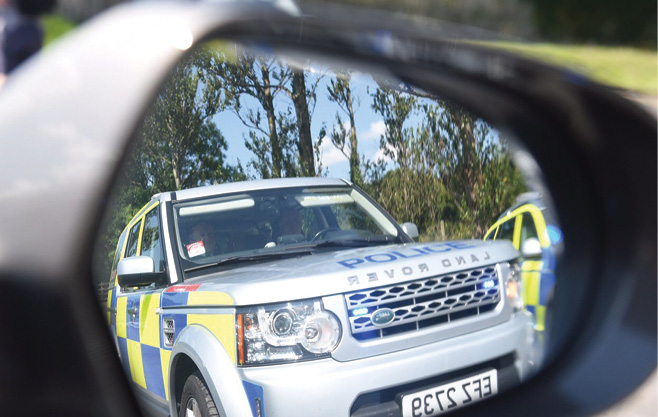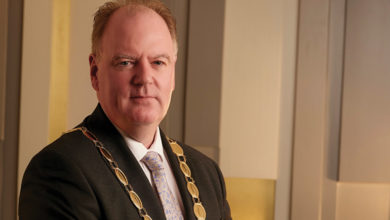The ABC of policing


In recent years, against the backdrop of severe budgetary constraints, policing across the North has experienced a major overhaul, the adjustment of area boundaries and the subsequent restructuring of frontline service delivery. Ciarán Galway visits Banbridge PSNI station to discuss local policing with Superintendent Davy Moore, commander of Northern Ireland’s second largest district.
In 2015, the PSNI’s seven districts (A-H) were increased to 11 in order to reflect the new district council boundaries. The districts are supported by one of three Area co-ordinating tiers: Belfast City, North Area Policing and South Area Policing.
Home to over approximately 208,000 people, the Armagh, Banbridge and Craigavon District is contained within the South Area and geographically mirrors its council namesake. District Commander Davy Moore is responsible for all components of local policing and the formation of policing priorities within the region.
Encompassing Lurgan, Craigavon and Portadown in the north, the district extends to include Banbridge and Dromore to the east, the Monaghan border on its southern extremity and Armagh city in the west. Alongside an estimated 8,000 businesses which inhabit the district are a number of significant pillars of regional infrastructure, including sizeable sections of both the A1 dual carriageway and the M1 motorway.
Moore notes: “With regards to the Portadown, Craigavon, Lurgan urban salient, it is now the biggest concentration of urban living in Northern Ireland outside of Belfast. Then we have rolling hinterland towards Banbridge and the Monaghan border as well. So we are a border command as well as being equally urban and rural focused.”
Policing in the Armagh, Banbridge and Craigavon District is provided through two Local Policing Teams (LPTs) located in Armagh and Lurgan police stations, supported by four Neighbourhood Policing Teams (NPTs) based in Armagh, Mahon Road and Lurgan stations. The area is subdivided into seven District Electoral Areas (DEAs), namely Armagh, Banbridge, Craigavon, Cusher, Lagan River, Lurgan and Portadown, with an additional sub-DEA in Banbridge town. Officers report to either Lurgan or Armagh LPT before attending to their DEA.
Superintendent Moore explains: “Every officer is attached to a DEA, irrespective of what your role is. In doing that, we have tried to bring the principles of Policing with the Community to everyone. That was part of the problem with the old system, that the response officers saw neighbourhood policing as just something neighbourhood cops did.”
Expanding on this concept, he outlines: “It used to be said that if you got the staff in any given police station together, you could build a house because there are so many secondary talents that people possess. Well, of course now, we are able to draw on people who used to be school teachers, others who were tech designers, or people who worked in marketing and we have unleashed all of this talent, which actually we were holding back a little bit.”
Local policing teams
Local policing teams are encouraged to develop a sense of ownership of their area and the unique challenges that it may pose. They are expected to collate an enhanced understanding through engagement with the key constituents of the local community, including Church leaders, elected representatives and school principals. This is intended to enhance the delivery of a Policing with the Community approach.
Traditionally LPTs were simply regarded as the responders. However, Moore asserts: “We have tried to make them more than that. They have seen a significant increase in their resources, so they are much bigger teams now. What we’re trying to achieve is a bit of that value-added policing within the pressures of response and getting to calls. Some of those call signs are specifically dedicated to that neighbourhood policing style. We encourage them all to involve themselves in it, to a greater or lesser degree depending on the demand coming at them. Some of them are sliced away and only in extreme circumstances will they get response calls sent to them.”

Neighbourhood policing teams
Areas with additional needs, such as those with higher crime rates, deprivation and isolation are specifically targeted with Neighbourhood Policing Teams to provide a further, tailored presence.
Previously “every given location in Northern Ireland fell as part of a sector which had a dedicated neighbourhood policing team attached to it. You couldn’t set foot anywhere in the six counties without that applying”, while neighbourhood policing teams were “quite resource intensive in terms of the number of officers we had and we found ourselves policing in an almost one size fits all manner”. This is no longer the case
Moore emphasises: “Being fair to people is not just about treating everyone the same way, it’s about treating people according to their needs. We’ve tried to bring our resource to where the risk is and where the need is. Now, that has been seen in many quarters as simply walking away from neighbourhood policing. Actually, we’re trying to get much more focused and better at it.”
“Sometimes we rely less on the formal engagement structures and more on those individual relationships. That’s not wrong, it’s just different.”
He adds: “The neighbourhood teams are the problem solvers; they bring value-added policing to any given problem. We try to give them the time, by controlling how much work they’re given, to sit down, develop partnerships and engage at an increased level. It would be wonderful to have more of them. I have four critical neighbourhood policing teams in my area and they do marvellous work and are absolutely where they’re needed.”
While still geographically-based, many NPTs focus on an area as small as a large estate and standard geographical boundaries have been subdivided on the basis of need alone.
In order to identify ‘need’, Moore explains: “[The PSNI] used a thing called the Community Prioritisation Index which we started building several years ago, initially looking at 10 socio-economic factors, including crime rates, but also quality of life issues. We added another 14 areas into that before including some of our own experiences and knowledge of the areas, which I think is invaluable.”
Often, one symptom of an area exhibiting additional need is a disconnect between the PSNI and the local community. “We have to be hugely respectful of people’s identities sometimes, because they can be coming from an environment where being seen to be acting with or alongside the police is still a difficult thing. That’s not just down to the old tribal, sectarian issues. The reality is that there are large parts of Manchester, Dublin or any other big city where you just don’t do business with the police.
“In our context, there are some areas where you just have to expect to do things slightly differently and those neighbourhood officers go into those communities. They are a constant and regular presence.
“Sometimes we rely less on the formal engagement structures and more on those individual relationships. That’s not wrong, it’s just different. We are happy to move into whatever space people are confident and comfortable to operate in.”
Focus
In response to a question regarding policing focus, Moore details: “One of the key features, which I am always pleased to be reminded of, is that no matter where in the command you go, whether you are in a very built-up, high density estate or in the countryside, it’s the ordinary things that matter. Things like antisocial behaviour, burglary and the stuff that actually impacts upon people’s lives.”
He elaborates: “We’re still very fixed on the physical crime. We also try to focus as much on the quality of life issues as we can. In order to address those quality of life issues, with a reducing budget, we’re trying as hard as we can to collaborate and build partnerships. That from our perspective is a way of acting as a force multiplier. We know we can’t do it all on our own, if we tried to do it in isolation, we could fail. So we get the council, the community safety partnerships, neighbourhood watch groups and so many other groups that we can tap into and build up links with.”
At the same time, digital crime has emerged as an increasing concern for the PSNI. “We now know, across these islands, that digital crime represents about a third of physical crime and that concerns us. We’re seeing scams and online fraud happening at an increasing rate. Even more testing are the digital crimes which concern young people and their personal safety.”
As such, the organisation is attempting to make its next big move into the digital age while also striving to strike a balance between what people can see and feel, and what it knows is happening in the digital sphere.
Challenges
Moore identifies resourcing within a finite budget as the most pressing challenge that he faces. Citing community demands, alongside internal service and bureaucracy requirements, as significant resource pressures, he suggests that a major challenge is also delivering optimal efficiency in terms of time and resource prioritisation.
Evidently this requires a degree of introspection, and the Superintendent illustrates the associated thought process. “Are we spending money in the right places? Are we putting our people in the right area? Do we have the balance between prevention and detection worked out? Do we have the balance between digital crime and physical crime right?”
Social media
Social media, as across virtually every sector, is a valuable commodity for policing. Moore explains: “We can get our information from them and our community safety messages to them. For example, we ran a campaign – Top Ten Tips – the 10 little things you can do to make your house far less attractive to burglars, over the Christmas period. As a result of that, our burglary rates over Christmas are much lower than they have been for five years.”
However, he recognises: “Probably the most important thing is that [social media] humanises our officers. There are still sections of the community that just see us as ‘the bloody police’. We can demonstrate that we have a sense of humour, we get hurt sometimes, we get offended and tired. That, I think, has been hugely successful in removing some of the barriers that still exist in some sections of the community between us and them.”
Vision
Moore, and the wider PSNI as a whole, articulates a clear vision for the future. “We want to continually push forward, so that every member of the community can look at our officers or passing patrol and think, ‘there’s our police’.”
Referencing high confidence ratings, Moore emphasises: “We don’t want to get complacent. While there is one person who can look at any of my officers and sneer, then we have work to do. The vision is that we play our role, as difficult as that sometimes is, and we’re facing particular difficulties within society now, to make everyone feel safer, more confident and to make the piece of Northern Ireland for which I’m responsible, a much more comfortable place in which to live.”
To achieve this, Moore acknowledges: “We have to keep delivering on the basics and when something terrible happens, such as a terrorist attack or a major transport incident or flooding incident, we need to demonstrate that we have the capability to get ahead of that and, when awful things happen, be there to deal with them very effectively. We also need to keep driving forward with community engagement. We need people to understand us and we need to understand them better.”
Profile: Davy Moore
East Belfast native Davy Moore has 22 years’ police service and is currently into his 23rd posting. He has served in almost every part of Northern Ireland and across almost every department within the PSNI. Some of his highlights have included staffing successive chief constables during the transitory period, including Ronnie Flannagan, Colin Cramphorn and Hugh Orde.
“To be at the top table alongside the Chief Constable during those days was fascinating and that will never leave me. I had a role working with the British Foreign Office, Downing Street and the Home Office around G8 which I’ll probably never see the like of again unless the Holy Father comes to visit Northern Ireland, which I’m crossing my fingers for.
I just want to point out that we have the ecclesiastical capital of Ireland in this district and I’ll be very disappointed if we don’t see him.”
He adds: “I owe everything to the PSNI and the RUC before it. I have a Master’s degree in Police Leadership and Management solely through my policing service and I studied with the FBI in America. I am hugely grateful for the opportunities that policing has given me. In many ways I feel that I am paying back a debt every day because having attended meetings at Number 10, to having been involved in presidential moves in Washington DC and hopefully to be involved in a Papal visit, it just couldn’t get any better.”





